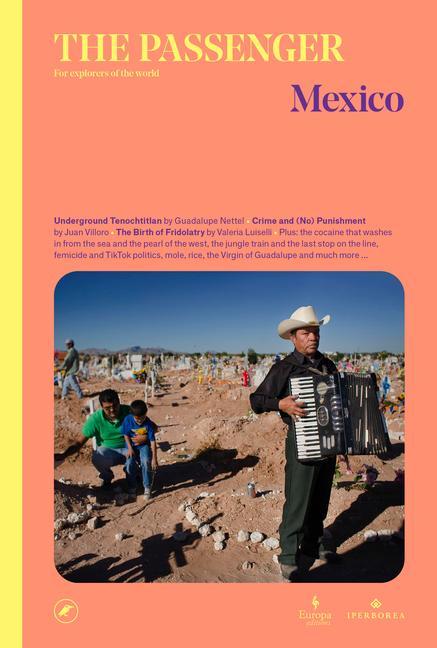
Zustellung: Mi, 06.11. - Fr, 08.11.
Sofort lieferbar
VersandkostenfreiBestellen & in Filiale abholen:
Fully-illustrated, The Passenger collects the best new writing, photography, art and reportage from around the world.
IN THIS VOLUME: Underground Tenochtitlan by Guadalupe Nettel - Crime and (No) Punishment by Juan Villoro - The Birth of Fridolatry by Valeria Luiselli - plus: the cocaine that washes in from the sea and the pearl of the west, the jungle train and the last stop on the line, femicide and TikTok politics, mole, rice, the Virgin of Guadalupe and much more ...
Once synonymous with escape and freedom, Mexico is now more frequently described as a place plagued by widespread violence, drug trafficking, endemic corruption, and uncontrolled migration. Under the patina of a tourist paradise--with its beaches, its ancient ruins, its tequila--lies a complex, dynamic country trying to carve out a place for itself in the shadow of its powerful neighbor.
The most populous Spanish-speaking country in the world, Mexico is also home to 89 indigenous peoples and languages: one of the many contradictory legacies of the country's colonial past, which still permeates its politics, society, religion, food, and culture. With a fifth of the population identifying as indigenous, the issue of rediscovering and revaluing the country's pre-Columbian roots is at the center of the public debate. The controversial Mayan train project, which would connect Mexico's Caribbean resorts with the South's archaeological sites, crossing (and endangering) communities and forests, is a perfect example of the opposition between the two souls of the country.
The attempts to resolve this contradiction, or better still to learn to live with it, will define the Mexico of the future. Only by recognizing equal status to ethnic and linguistic minorities will the country be able to reconcile its fractured identity.
IN THIS VOLUME: Underground Tenochtitlan by Guadalupe Nettel - Crime and (No) Punishment by Juan Villoro - The Birth of Fridolatry by Valeria Luiselli - plus: the cocaine that washes in from the sea and the pearl of the west, the jungle train and the last stop on the line, femicide and TikTok politics, mole, rice, the Virgin of Guadalupe and much more ...
Once synonymous with escape and freedom, Mexico is now more frequently described as a place plagued by widespread violence, drug trafficking, endemic corruption, and uncontrolled migration. Under the patina of a tourist paradise--with its beaches, its ancient ruins, its tequila--lies a complex, dynamic country trying to carve out a place for itself in the shadow of its powerful neighbor.
The most populous Spanish-speaking country in the world, Mexico is also home to 89 indigenous peoples and languages: one of the many contradictory legacies of the country's colonial past, which still permeates its politics, society, religion, food, and culture. With a fifth of the population identifying as indigenous, the issue of rediscovering and revaluing the country's pre-Columbian roots is at the center of the public debate. The controversial Mayan train project, which would connect Mexico's Caribbean resorts with the South's archaeological sites, crossing (and endangering) communities and forests, is a perfect example of the opposition between the two souls of the country.
The attempts to resolve this contradiction, or better still to learn to live with it, will define the Mexico of the future. Only by recognizing equal status to ethnic and linguistic minorities will the country be able to reconcile its fractured identity.
Mehr aus dieser Reihe
Produktdetails
Erscheinungsdatum
14. September 2023
Sprache
englisch
Seitenanzahl
192
Reihe
The Passenger
Illustrationen
Edoardo Massa
Verlag/Hersteller
Produktart
kartoniert
Gewicht
480 g
Größe (L/B/H)
238/159/16 mm
ISBN
9781787704695
Entdecken Sie mehr
Bewertungen
0 Bewertungen
Es wurden noch keine Bewertungen abgegeben. Schreiben Sie die erste Bewertung zu "The Passenger Mexico" und helfen Sie damit anderen bei der Kaufentscheidung.












